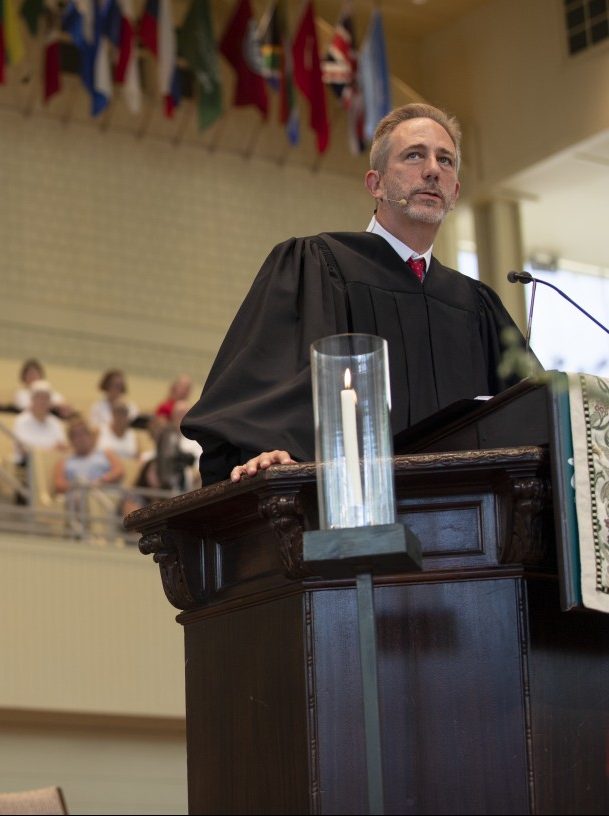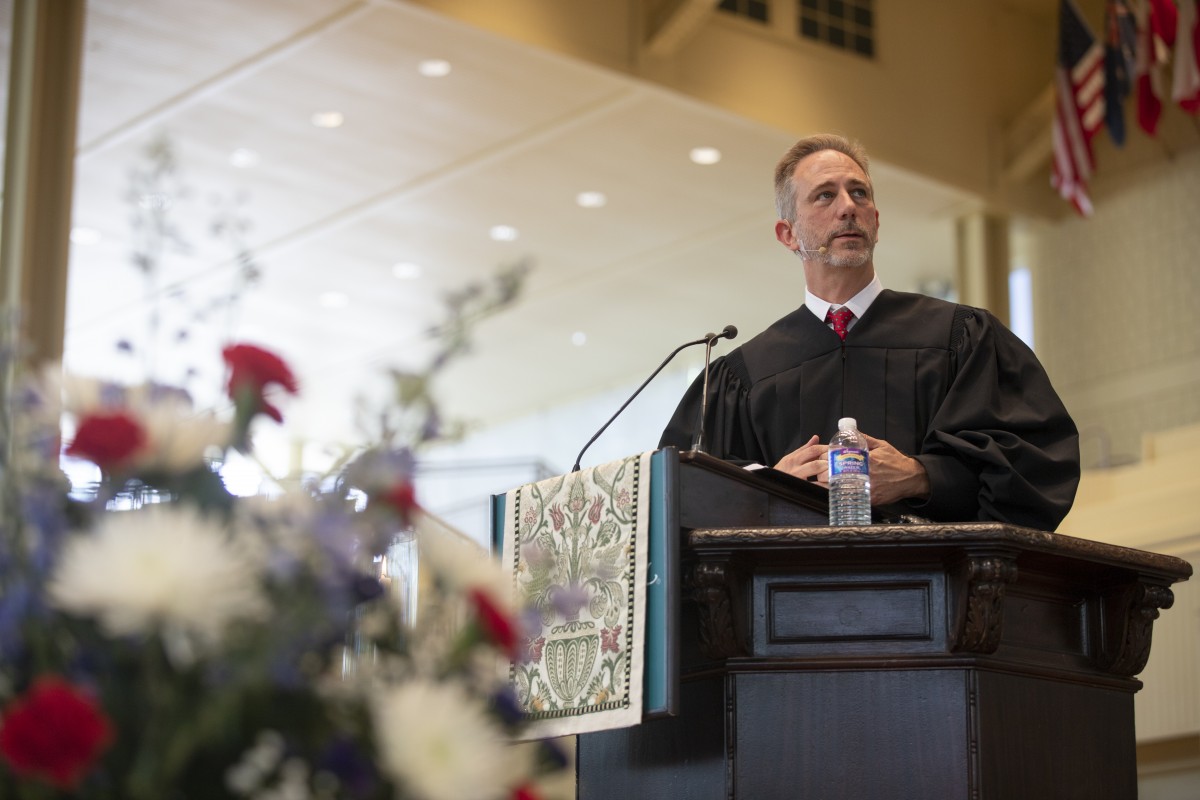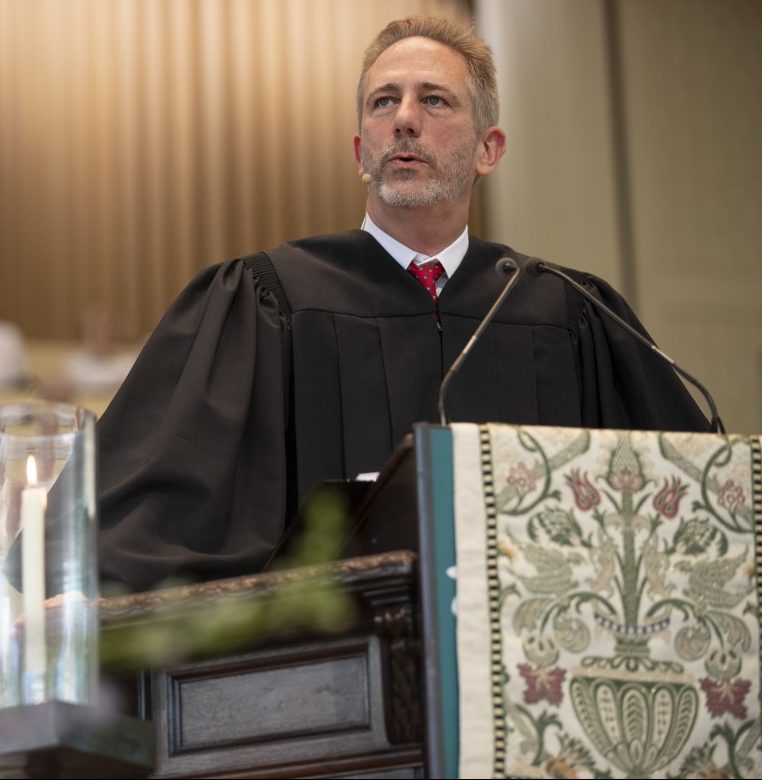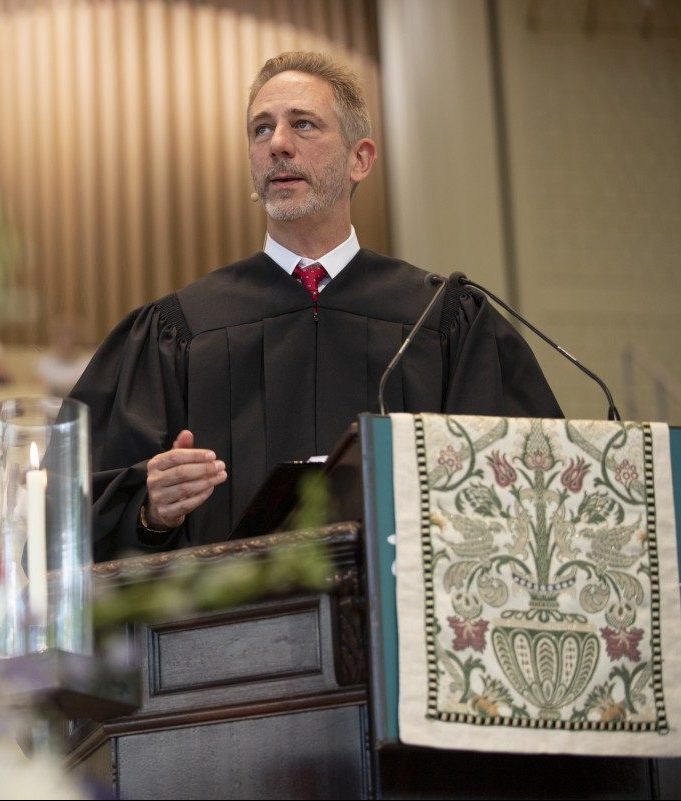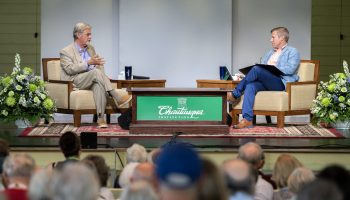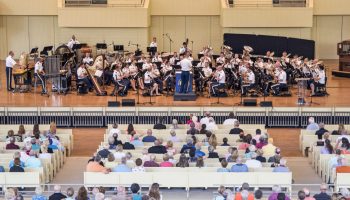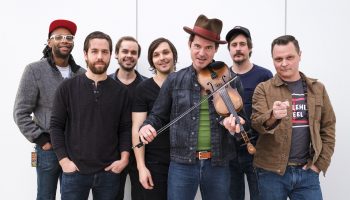“I am not ashamed to be called a patriot, but I am not in love with the mythologized America. I have always known America is not perfect, but I value its historical sentiments,” said the Rev. David Gushee at the 10:45 a.m. Sunday morning worship service, July 1 in the Amphitheater.
His sermon title was “The Kingdom of God and America,” and his Scripture text was Matthew 6:7-15, Matthew’s version of the Lord’s Prayer.
Gushee said that when the Rt. Rev. V. Gene Robinson invited him to speak, the themes for this week — “American Identity” and “Religion and American Identity” — jumped out at him.
Gushee grew up in the suburbs outside of Washington, D.C., and most of his friends’ parents worked for the federal government. His father, a Korean War veteran, worked for the Congressional Research Service and helped to craft some of the earliest environmental and energy policies.
“Dinner table conversation often focussed on public policy, not always riveting for a 15-year old,” Gushee said.
Gushee had a religious conversion experience at age 16, and while he was in seminary, he found the discipline of Christian social ethics helped put together his family life in government policy with his experience of being reborn.
Twice he had the opportunity to move to England, but he “could not imagine settling in any other country.”
Gushee quoted Sen. John McCain’s book, The Restless Wave. McCain wrote that he would like to see America’s politics return to the policies and practices that separate our government from others. McCain wrote that as Americans, we owe each other respect, that we have a shared devotion to the ideals of equality, justice and human rights.
“Who among us,” Gushee said, “remains unmoved by the words: ‘We hold these truths be to self evident, that all men — now all people — are created equal, that they are endowed by their Creator with certain unalienable Rights, that among these are Life, Liberty and the pursuit of Happiness’? ”
Even though the Constitution of the United States does not “sing” like the Declaration of Independence, Gushee said it has stood the test of time with its high principles and fallibilities.
James Madison wrote in Federalist No. 51: “If men were angels, no government would be necessary. If angels were to govern men, neither external nor internal controls on government would be necessary.”
Humans, said Gushee, “must seek the values of the Kingdom of God” even if we can’t make it on earth.
America has always seen itself as a Christian nation in a special covenant with God. That the United States is “the Kingdom of God on earth is a holdover from Europe,” he said, and the idea of a new kind of promised land was accelerated here.
Gushe quoted extensively from John Winthrop’s 1630 sermon to the people of Plymouth, Massachusetts: that they were like a shining city set on a hill that all could see. Gushee said most people don’t know the whole sermon.
Winthrop’s Scripture was Micah 6:8: “What does the Lord require of you but to do justice, love mercy and walk humbly with your God.” Winthrop called on the people to abridge their abundance so that others couldhave what is necessary. He was calling on t he whole city to be a church, and the vision of a shining city set on a hill never left American mythology.
“Ronald Reagan quoted Winthrop more than once when he ran for president in 1980,” Gushee said.
In a graduation speech in 1952, Reagan could still see the idea of America as an outpost of the Kingdom of God was part of our history.
“It is doubtful Jesus would recognize this idea,” Gushee said. “Jesus emphasized the Hebrew Bible.”
In the Gospel of Mark, Jesus told the people that the time was fulfilled, the Kingdom of God was at hand, and what God promised in the prophets was at hand.
God was first king of the Jews and then king of the world. The world belonged to God, and the Jews belonged to God. God punished both but in Jesus, God was reclaiming both, Gushee said.
“Repent and believe the good news, the rebellion of humans has been brought to an end,” Gushee said. “This is the backup of the Lord’s Prayer. So often we recite it but we don’t know what it means.”
The people who listened to Jesus at the Sermon on the Mount were hungry for good news, and they wanted to believe that Jesus of Nazareth was God’s Messiah. They wanted to know how to pray.
Jesus taught them to pray to God as a father and not a tyrant, said Gushee. They were to pray for God’s will to be done on earth as in heaven, to have enough food, to forgive as they were forgiven, to avoid temptation and be delivered from the evil one.
“This is a very Jewish prayer,” said Gushee. “Would they finally be healed? Would there be right relations between people, finally? The Kingdom of God is not ‘out there’ salvation, but earthly salvation. The world finally knows wholeness as it was first intended. Idolatry, racism, poverty gives way to love, dignity and respect for all people.”
Simply identifying the United States as the Kingdom of God was never a right, he said. Our country never qualified as an outpost of the Kingdom of God.
“But that does not mean that we put the idea away on a shelf of discarded ideas,” Gushee said. “The Kingdom of God is relevant as a challenge, a critique, a prophetic challenge — and we need it now more than ever.”
All our nation’s leaders are accountable to God, Gushee said, and God is against violence, bullying and dehumanization. God is for peace, justice, mercy and forgiveness. We have known this as a nation in principle even though we practiced slavery, Jim Crow and racism, he said.
If we think of the Kingdom of God as Jesus taught, we can repent and begin again, he said. In this week on “American Identity” at Chautauqua, “we will join in the celebration of America, not the mythologized America, but we will celebrate who we can be and who we have aspired to be.”
Gushee quoted several passages from Martin Luther King, Jr.’s written text of his “I Have a Dream” speech. King, he said, celebrated American values and deployed the image of the Kingdom of God to press Americans to live up to who we say we are.
King did not believe the bank of justice was bankrupt, that these American values were deeply rooted. King believed that America could still rise up to live out its creed.
“King had an Old Testament, Kingdom of God hope, where every valley would be exalted, every hill made low and the glory of the Lord would be revealed to all flesh,” Gushee said.
America is not and never has been the Kingdom of God, he said, “but the Kingdom of God permeates the vision of how our values should be arranged and tests the behavior of our maddening, proud, divided people.”
Gushee invited the congregation to stand and pray the Lord’s Prayer for the third time in the service.
“… as you say it, think about America,” he said.
The Rt. Rev. V. Gene Robinson, vice president of religion, presided. David Griffiths, vice president and Richard and Emily Smucker Chair for Education, read the Scripture. The hymn-anthem was “America the Beautiful,” choral setting by Mark Hayes. J. Paul Burkhart served as narrator. Peter Steinmetz served as cantor for Responsorial Psalm 121, “Our Help come from the Lord,” setting by Michael Joncas. The response to the morning prayers was “Chautauqua Anthem,” commissioned by the Chautauqua Choir from Paul Moravec in 2017 to honor organist and coordinator of worship and sacred music Jared Jacobsen’s more than 20 years of service to Chautauqua Institution. The Chautauqua Choir sang “He Comes to Us as One Unknown” by Jane Marshall for the offertory anthem. The hymn after the sermon was “Lift Every Voice and Sing” by J. Rosamond Johnson. “God Bless America” by Irving Berlin was the choral response to the Benediction. The organ postlude was “Variations on ‘America’ for Organ,” by Charles Ives. The Edmond E. Robb-Walter C. Shaw Fund and the J. Everett Hall Memorial Chaplaincy provide support for this week’s services.


